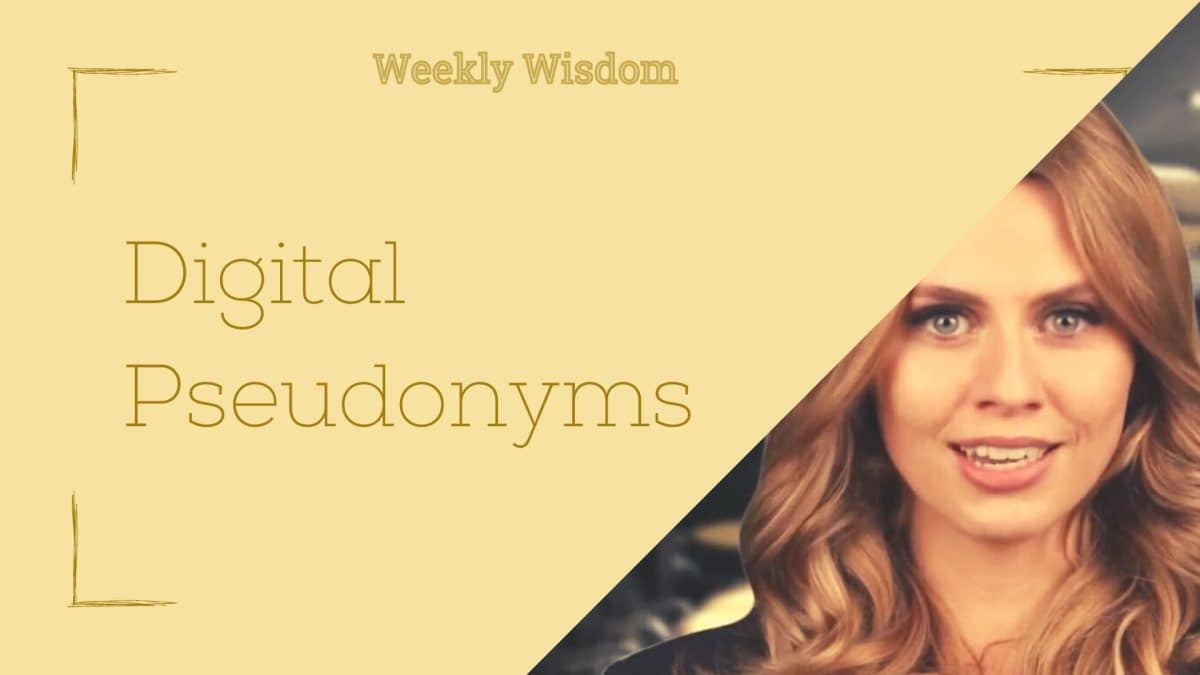Hello Subscribers, New and Old.
Welcome to Weekly Wisdom, your weekly dose of highlights, quotes and notes from my notebook. If you would like to receive this in your inbox, subscribe now. If you want to support, do checkout the links in the Friends of Weekly Wisdom Section.
💡Something I learned
AI Avatars as Electronic Pseudonyms
When Benjamin Franklin, famed inventor, diplomat, lothario and American revolutionary, was a prolific writer as well. And he regularly employed pseudonyms to do so. Most famous of which was Ms. Silence Dogood. Invented to fool his brother James Franklin publish him.
Pseudonyms allow people to explore taboo subjects, by pass censorship, and even separate themselves from their work. Stephen King wrote in parallel obscurity for years as Richard Bachman, until being outed. He wanted his work to speak for it self.
Those of us who grew up in the early days of the internet have mixed feelings on the phenomenon. It allowed us to explore new ideas, but it also provided cover for some horrid behaviour. Still, I’d say not having all my acts online tied to my name was a net positive.
Once the primary method of the web shifted to video, it became difficult to have pseudonym. In recent years, there have been many online personality that found a workaround in the form of VTubing; using animated avatars. However it is a just a stop-gap to AI generated human avatars.
The early efforts are clunky and veer too far down the uncanny valley. But the technology will only improve from now on. The day isn’t far where a youtuber will create their Richard Bachman to explore other ideas.
📕Something to read
- Do McKinsey and other consultants do anything useful?: The efficacy of big consulting firms has been a question for decades. See this Steve Jobs video, from the NEXT years.
🔉Something to listen
- Christophe Cappazzola on WWI and the birth of the US nation: Lex Fridman delivers once again. Mr. Cappozzola is a professor of history at MIT. He discusses how US’s entry in to WWI created the US nation state as we know today. It is a great discussion that touches on the history of propaganda, the draft, the selective service, and how citizens relate to the state.
Friends of Weekly Wisdom
- Refind: The essence of the web, every morning in your inbox. Tens of thousands of busy people start their day with their personalized digest by Refind. Sign up for free and pick your favorite topics and thought leaders. https://refind.com/?utm_source=newsletter&utm_medium=barter&utm_campaign=FU-SmtfFzzhQJDgFEz5eiw
- The Sample: The Sample lets you try the best newsletters based on your interest. With one-click you can subscribe if you like.
🗣Some Quotes and Notes
Shame & Sensibility
A great short piece on exploring your stupid obsession. It is a great way to foster creativity. The author uses the example of Walt Disney’s obsession with trains, which led to the creation of Disneyland.
Though life is random and spontaneous, something in the human psyche expects a linear, ascending staircase towards the penthouse of success. Fearing judgment, people are scared to explore unproven avenues. Second-time authors, musicians, and entrepreneurs struggle because they’re afraid to go back to the beginning and look like a novice again.
—David Perrell, Dreaming Like Disney
IQ is a grift
IQ is not a measure of intelligence. At best it is a measure of mental disability in certain circumstances. Its predictive measures are dubious, the scientific data is bunk, and even it wasn’t the results are non-linear. A great take-down rant on this snake-oil by NN Taleb
Psychometrics peddlers looking for suckers (military, large corporations) buying the “this is the best measure in psychology” argument when it is not even technically a measure — it explains at best between 2 and 13% of the performance in some tasks (those tasks that are similar to the test itself)
…
Metrification: If someone came up w/a numerical“Well Being Quotient” WBQ or “Sleep Quotient”, SQ, trying to mimic temperature or a physical quantity, you’d find it absurd. But put enough academics w/physics envy and race hatred on it and it will become an official measure.
— Nassim Taleb, IQ is largely a pseudoscientific swindle
Chinese Democracy
It is a shame that one of the most powerful forces in the world do not get the deference it deserves. News from China, when not wholly ignored by the Anglo-phone global media, is never gven the importance it deserves. Xi Jinping was elected as the leader of China for a historic third-term this past week. This essay is a great out line of his current approach to tech economy.
Additionally, under Xi-thought, selling more products to the same consumers is “rent-seeking” and so not exactly socially responsible. President Xi sees the US as a declining nation partly due to this rent-seeking and the obsession with social media and “financialization”. Hypothetically one could counter Xi by saying that China itself is highly financialized given its enormous corporate debt load. But that’s probably not how he understands the term. In his mind, financialization means that American energy is overly focused on financial innovation.
—Rahul Malhotra, What Xi Wants
Thank you for joining me this week. If you know some who might enjoy this, please forward this email to them. See you next week.
Mudassir Chapra

